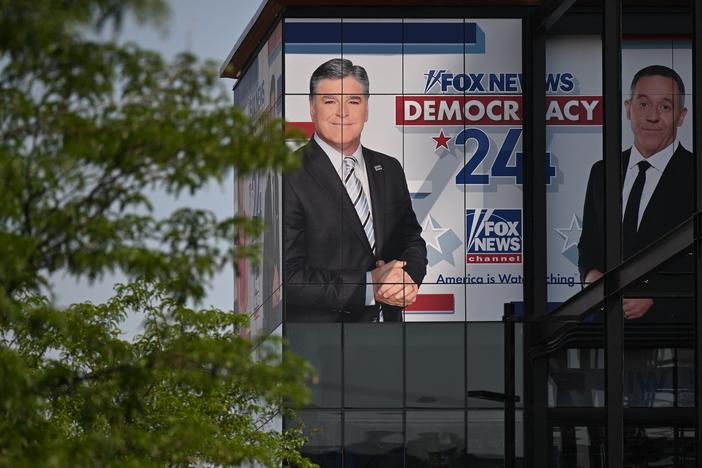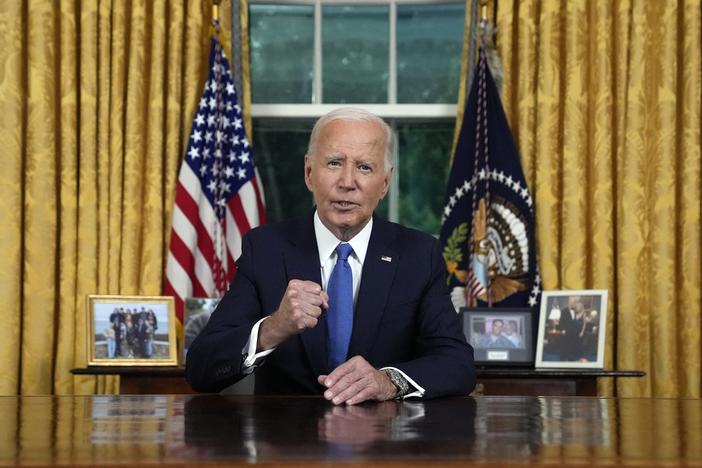Section Branding
Header Content
Elon Musk is backing Donald Trump. Could that hurt Tesla?
Primary Content
Tesla CEO Elon Musk is throwing his weight behind former President Donald Trump in the highly polarized 2024 presidential election, prompting many questions — including whether the move might prompt current or prospective electric vehicle buyers to avoid the car brand.
The speculation comes at a time of transition for both the wider EV industry and Tesla in particular. On Tuesday, the company reported a 45% drop in quarterly profits compared to the same period in 2023, saying it is “currently between two major growth waves.”
In its earnings report, Tesla said it has enough cash and resources to carry out its plans “during this uncertain period.”
Other automakers have also been reporting less-than-stellar financial results in their EV lines. But in Tesla’s case, Musk’s embrace of a Republican candidate who opposes lucrative federal EV tax credits is feeding speculation about the company’s overall strategy, and whether it could be harmed by its CEO’s political sentiments.
What did Musk do?
Musk announced, "I fully endorse President Trump" after the July 13 assassination attempt in Pennsylvania. He has also been linked to a pro-Trump super PAC. On Sunday, Trump told a crowd at a rally in Michigan that he recently spoke to Musk.
“Elon endorsed me the other day and I read, I didn't even know this. He didn't even tell me about it, but he gives me $45 million a month.”
But Musk had a different narrative when he was recently asked about his support for the former president.
“What's been reported in the media is simply not true,” Musk said in an interview with psychologist and pundit Jordan Peterson that was published Monday. “I'm not donating $45 million a month to Trump.”
“What I have done is I have created a PAC, a super PAC,” called the America PAC, he said, adding that the money would be used “on the Democrat and Republican side.”
“It's not meant to be sort of a hyperpartisan PAC,” Musk said. “Our intent is to promote the principles that made America great in the first place. I wouldn't say that I'm say, for example, MAGA — ‘Make America Great Again.’ I think America is great. I'm more MAG — Make America Greater.”
The super PAC has been linked in recent reports to political operatives from the inner circle of Florida Gov. Ron DeSantis (who was once suggested as Musk’s potential favorite among the 2024 candidates).
The super PAC's goal is to support meritocracy, Musk said.
“You get ahead as a function of your hard work and your skill, and nothing else,” he said. Another goal, he said, is promoting a “freedom to operate, meaning like the least amount of government intervention possible.”
Musk’s support of Trump comes after months of controversial statements and criticisms of Democrats and the Biden administration. He noted in 2021, for instance, that the White House seemingly snubbed him and Tesla when it held an event setting ambitious U.S. sales targets for zero-emission vehicles. Musk tweeted in May 2022 that he would vote for a Republican for the first time.
Trump has frequently derided the push for more electric vehicles. And his running mate, Sen. J.D. Vance of Ohio, shares those views. Last fall, Vance introduced legislation in Congress to repeal four different EV tax credits and instead “provide up to $7,500 for new gas- or diesel-powered vehicles” made in the U.S. In an opinion piece for The Toledo Blade, Vance urged the United Auto Workers (who were then on strike) to use their leverage to end subsidies to the U.S. EV industry — which he called a “failed experiment."
What are EV enthusiasts fans and customers saying?
On Tesla owners’ forums such as the Tesla Motors Club and Tesla Owners Online, responses to Musk’s lean to the political right vary from dismay over his embrace of Trump, who routinely criticizes EV credits, to confidence that Musk is playing a strategic political game to protect Tesla.
For members of the Kalamazoo Electric Vehicle Association in Michigan, there’s a longstanding unofficial rule: avoid politics and focus on a shared goal — promoting the adoption of EVs, says the group’s leader, Paul Pancella, who is also a physicist at Western Michigan University.
The rule is widely respected, Pancella tells NPR. And for him, it’s easy to “give Musk his due as an entrepreneur, businessman, perhaps even visionary,” whatever he might say about politics or other matters.
“I do worry that he is not helping further penetration of EVs into the car market,” Pancella says of Musk’s public statements in recent years. “Tesla brand vehicles offer good value relative to other EVs and cars in general, and are arguably the best option for those who want to regularly travel long distances.”
That concern isn’t misplaced, according to recent data from CivicScience. The consumer research firm cites data from mid-July, showing that people who are environmentally conscious consumers or are Democrats viewed Musk and Tesla less favorably than they did earlier this year.
"These data highlight a real challenge for Tesla,” CivicScience founder and CEO John Dick said in a statement to NPR. “EV buyers skew left-of-center politically, given their concerns around climate change and fossil fuels. However, when the CEO of a car manufacturer speaks out so publicly in support of a Republican candidate or cause, it will naturally steer those buyers to other brand alternatives."
Other sources of fallout are more overt. In Connecticut, state Rep. Aimee Berger-Girvalo, a Democrat, reportedly said last week that since Musk “started to align himself with extreme authoritarian values,” Democrats were less likely to support state legislation that could benefit Tesla.
How is Tesla doing?
Profits fell 45% in the second quarter of 2024 compared to the same period last year, the company announced on Tuesday, with net income of $1.48 billion in the recent quarter. In its automotive business, total revenue fell a more modest 7% from last year’s second quarter.
The results suggest Tesla is feeling similar doldrums as the rest of the EV sector, with a few signs of forward momentum. For one thing, total revenue rose to $25.5 billion: Tesla said it saw “record quarterly revenues despite a difficult operating environment” that includes high interest rates.
In contrast, the company attributed the profits swoon to factors such as market adjustments and investments in long-term plans. Tesla cited lower prices for cars and higher operating costs, “largely driven by AI projects.”
Tesla’s profits got a big boost from record amounts of regulatory credit revenues, as it took in $890 million from sales to other carmakers to compensate for their vehicles not meeting emissions requirements. The company also reported rapid growth in its energy generation and storage businesses.
As for its new and planned vehicles, the carmaker said production of its Cybertruck “more than tripled sequentially and remains on track to achieve profitability by end of year.” The company says it's on track to produce electric semi trucks by the end of next year.
Tesla also retains high hopes for its long-promised Robotaxi vehicle, saying it has “outsized potential value.” In a call after the earnings report came out, Musk said the Robotaxi is slated to be unveiled on Oct. 10, according to Investor’s Business Daily.
Bottom Content




